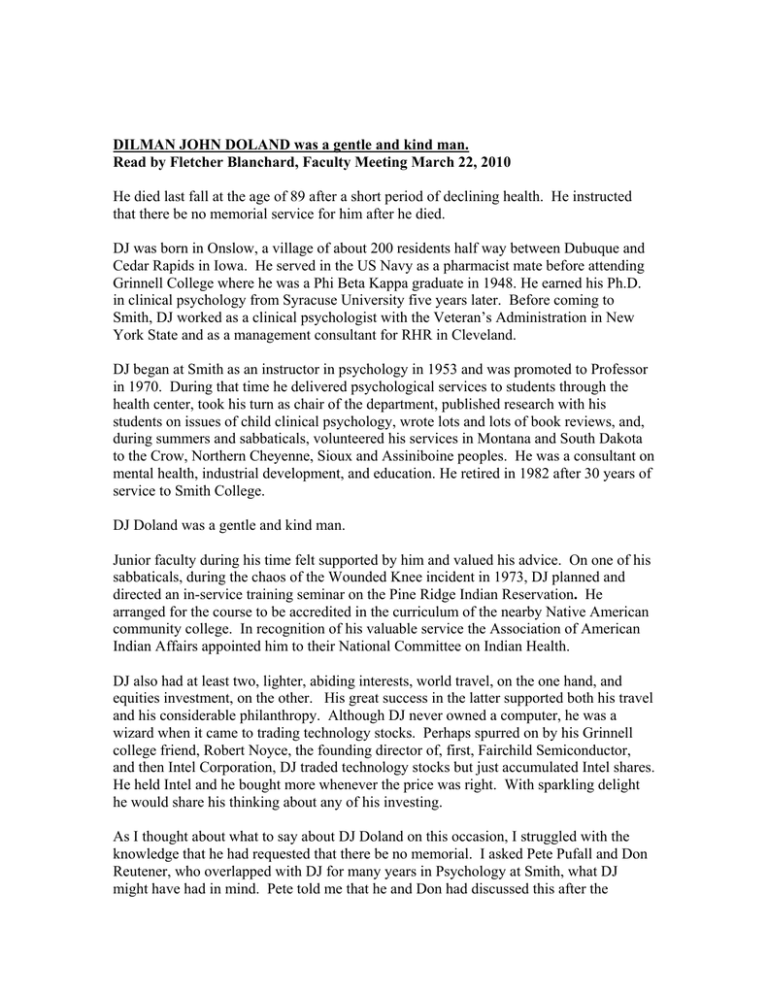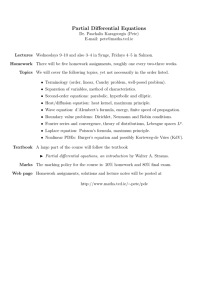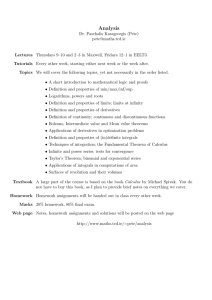DILMAN JOHN DOLAND was a gentle and kind man.
advertisement

DILMAN JOHN DOLAND was a gentle and kind man. Read by Fletcher Blanchard, Faculty Meeting March 22, 2010 He died last fall at the age of 89 after a short period of declining health. He instructed that there be no memorial service for him after he died. DJ was born in Onslow, a village of about 200 residents half way between Dubuque and Cedar Rapids in Iowa. He served in the US Navy as a pharmacist mate before attending Grinnell College where he was a Phi Beta Kappa graduate in 1948. He earned his Ph.D. in clinical psychology from Syracuse University five years later. Before coming to Smith, DJ worked as a clinical psychologist with the Veteran’s Administration in New York State and as a management consultant for RHR in Cleveland. DJ began at Smith as an instructor in psychology in 1953 and was promoted to Professor in 1970. During that time he delivered psychological services to students through the health center, took his turn as chair of the department, published research with his students on issues of child clinical psychology, wrote lots and lots of book reviews, and, during summers and sabbaticals, volunteered his services in Montana and South Dakota to the Crow, Northern Cheyenne, Sioux and Assiniboine peoples. He was a consultant on mental health, industrial development, and education. He retired in 1982 after 30 years of service to Smith College. DJ Doland was a gentle and kind man. Junior faculty during his time felt supported by him and valued his advice. On one of his sabbaticals, during the chaos of the Wounded Knee incident in 1973, DJ planned and directed an in-service training seminar on the Pine Ridge Indian Reservation. He arranged for the course to be accredited in the curriculum of the nearby Native American community college. In recognition of his valuable service the Association of American Indian Affairs appointed him to their National Committee on Indian Health. DJ also had at least two, lighter, abiding interests, world travel, on the one hand, and equities investment, on the other. His great success in the latter supported both his travel and his considerable philanthropy. Although DJ never owned a computer, he was a wizard when it came to trading technology stocks. Perhaps spurred on by his Grinnell college friend, Robert Noyce, the founding director of, first, Fairchild Semiconductor, and then Intel Corporation, DJ traded technology stocks but just accumulated Intel shares. He held Intel and he bought more whenever the price was right. With sparkling delight he would share his thinking about any of his investing. As I thought about what to say about DJ Doland on this occasion, I struggled with the knowledge that he had requested that there be no memorial. I asked Pete Pufall and Don Reutener, who overlapped with DJ for many years in Psychology at Smith, what DJ might have had in mind. Pete told me that he and Don had discussed this after the monthly breakfasts they had enjoyed with DJ had ended not long before his death. Pete said, “I believe it emerged naturally from his love for privacy, his humility and basically that he did not enjoy being fussed over. He cherished friends and family while he was alive. He would not be pleased to think that his passing should be a burden. Nor should it be a triumphal event. Memorials too often create caricatures, images that exaggerate a life. He preferred an honest acceptance of ourselves which is hardly the stuff of memorials. For DJ life and death were corporeal.” Pete goes on to suggest that, “I suspect he found no comfort in, and may have been offended by services that dwelt in the spiritual…. Memorials of this kind could not speak to DJ's belief about life and could not capture who he was.” DJ Doland was a gentle and kind man. [I incorporated remarks prepared and delivered by Don Reutener for a meeting of Smith emeriti several months ago and from emails from Pete Pufall.]




